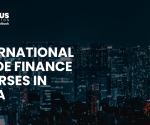You can reach great heights when you choose finance courses abroad. These courses help you learn strong money skills. You gain real-world tools and global views. You will study at top universities. You will meet students from around the world. You will find many chances. You grow your career and network. You learn things like investment analysis, risk management, and financial planning. You also explore topics like banking, corporate finance, and international markets. You walk into a supportive, diverse community. You improve your English and global thinking. You take classes with experienced teachers. You join clubs. You do real projects. You find internships with big companies. You prepare for a strong career in finance.
Finance Courses Abroad
Finance courses abroad give students a strong edge in the global market. These programs help you build deep finance knowledge and job-ready skills. You study under expert teachers and in top colleges. You meet students from all over the world and grow your global network. You can pick from many course types based on your career goal.
Types of Finance Programs
Begin by understanding program types. You can select:
- Bachelor’s in Finance Abroad: A four-year degree that covers money basics, accounting, corporate finance, and markets. It prepares you for entry-level roles or further studies.
- Master’s in Finance Abroad: A one to two year advanced degree. It digs into investment banking, risk, financial modeling, and global finance. It works well for career changers and leaders.
- MBA with Finance Specialization: A general business degree with finance focus. You learn management, strategy, and leadership besides finance. Companies hire many MBA grads.
- Short-term Certifications and Diplomas: These include programs like “financial modeling course abroad” or “certified financial planner program abroad.” These boost specific skills in weeks or months.
- Online and Blended Finance Courses Abroad: You study online and save on travel and living. Some include short campus visits for networking.
| Course Name | Type | Duration | Eligibility | Key Benefits |
| Bachelor of Finance | Undergraduate | 3–4 years | 12th pass (Commerce/Maths); English proficiency | Foundation in finance, economics, and accounting |
| BBA with Finance Specialization | Undergraduate | 3–4 years | 12th pass; Basic Math and English required | Business and finance blend; prepares for jobs or MBA |
| Bachelor of Commerce in Financial Management | Undergraduate | 3 years | 12th pass with Commerce/Maths | Covers corporate finance, banking, and taxation |
| Master of Finance | Postgraduate | 1–2 years | Bachelor’s in Finance/Economics; GRE/GMAT + IELTS/TOEFL | Advanced topics like asset pricing, markets, and modeling |
| Master of Financial Engineering | Postgraduate | 1–2 years | Strong Math/Stats background; GRE/GMAT | Prepares for quantitative and data-driven finance roles |
| MS in Finance | Postgraduate | 1–2 years | Bachelor’s in related field; Good GPA and test scores | Strong foundation in finance theory and analysis |
| MBA in Finance | Postgraduate | 1–2 years | Any Bachelor’s; Work experience often required | Combines leadership with finance; ideal for senior roles |
| CFA Preparation Programs | Certification | 6–12 months per level | Bachelor’s or final-year student; English skills | Global finance certification; valued by investment firms |
| CFP Certification | Certification | 6 months – 1 year | Bachelor’s degree; Financial background preferred | Prepares for financial advisory roles |
| PG Diploma in Finance | Diploma | 6 months – 1 year | Bachelor’s degree or equivalent | Cost-effective path for career change or upskilling |
| Diploma in Financial Planning | Diploma | 6 months – 1 year | 12th or Bachelor’s; varies by country | Focused on financial planning and advisory skills |
| Certificate in Investment Banking | Certificate | 3–6 months | Graduates or working professionals | Practical training in M&A, IPOs, and market analysis |
| Financial Modeling & Valuation Course | Certificate | 1–6 months | Open to all; Basic Excel preferred | Skill-building in Excel, forecasting, and valuation |
| Short-Term Course in Risk Management | Certificate | 1–3 months | Graduate or relevant field experience | Training in risk analysis, compliance, and frameworks |
| Fintech & Financial Analytics Courses | Certificate | 3–12 months | Graduates; Some may need coding/analytics basics | Learn emerging finance tech tools like blockchain, AI, and data analytics |
| Online Finance Certification Programs | Certificate | Flexible | Varies by course | Learn from global universities from home; affordable and flexible |
| Quantitative Finance Course | Postgraduate/Cert | 6 months – 2 years | Math-heavy background; GRE/GMAT required | Combines finance with statistics, programming, and modeling |
| IFRS Certification Course | Certificate | 1–6 months | Finance/accounting background | Understand international reporting standards used by global firms |
| Banking and Finance Integrated Programs | Undergraduate | 3–4 years | 12th pass (preferably commerce/math stream) | Covers both banking operations and finance principles |
| Finance and Accounting Integrated Degrees | Undergraduate | 3–4 years | 12th pass; English proficiency | Dual focus; prepares for diverse career paths |
Each option helps you learn, network, and grow. Pick the type that blends with your goals and budget.
Best Finance Courses Abroad
If you ask “what are the best finance courses abroad?”, consider program quality, ranking, faculty, location, cost, and industry links. Strong programs come from schools like London School of Economics, University of Melbourne, and University of Toronto. These universities offer high-quality teaching, global reputation, and strong alumni. They partner with banks, consultancies, and financial firms. Their programs rank high in global lists. They boost your resume and career chances.
Choosing Destinations for Finance Courses Abroad
Where you study matters as much as what you study. Some countries offer better jobs, others lower costs. Some give fast visas, others global exposure. Your pick shapes your career and budget. Read more about top destinations below.
Finance course in USA
The finance course in the USA offers top-ranked schools, wide specialization, and global recognition. You benefit from strong faculty and research. You meet top employers like Goldman Sachs, JP Morgan, and Deloitte. You can intern during your studies. You speak and learn in English. You face high costs but find many scholarships and assistantships.
Finance Course in UK
The finance course in the UK gives you a shorter path to a degree. You can finish a Master’s in one year. You learn in global financial hubs like London. You also find access to big banks and industries. Fees cost less than in the USA. You speak English and enjoy cultural heritage. You can work part-time during studies under student visa rules.
Finance course in Canada and Australia
Consider a finance course in Canada for lower fees and easy work-permit rules. You can do internships and stay after graduation with PGWP. You will study in vibrant cities like Toronto and Vancouver.
The finance course in Australia gives you high-quality programs and good living standards. You learn in cities like Sydney and Melbourne. You work on campus and apply for post-study visas. You join global finance companies and bond with alumni.
Admission Process and Eligibility
Admission steps look hard but go smooth with a plan. Start early, write good essays, and meet deadlines. You need test scores, documents, and a strong resume. Each program may ask for something different. Below is a guide to help you.
Eligibility Requirements
You need a degree, English score, and maybe GRE or GMAT. Some programs ask for essays and work history. Most finance programs need:
- A bachelor’s degree. Sometimes in finance, economics, or math.
- A good GPA (often above 3.0/4.0 scale).
- English proficiency tests (TOEFL or IELTS).
- GMAT/GRE scores for Master’s or MBA.
- Resume with academic and work history.
- Letters of recommendation (usually two or three).
- Statement of Purpose (SOP) describing your goals and why you fit.
Some short-term courses ask only for academic record and statement.
Application Steps
Send transcripts, take tests, and write your SOP. Get letters from teachers or employers. You apply in steps:
- Research programs and deadlines. Note early deadlines for scholarships.
- Send transcripts from your school.
- Take tests like TOEFL, IELTS, and GMAT/GRE.
- Write essays and SOP. Tailor them to each program. Show achievements, clarity, and strong motivation.
- Get recommendation letters. Ask professors or managers.
- Submit resume/CV clearly, without errors.
- Pay application fees (usually USD 50–150).
- Track application status online.
- Attend interviews (online or in-person) if asked.
Start early. Allow months to prepare for tests, essays, and letters.
Finance Courses Abroad: Fees and Funding
Studying abroad costs money, but many students manage it well. You pay for tuition, rent, food, and travel. Scholarships and part-time work help lower costs. Plan your budget early. Read below to know the fees and funding options.
Tuition Costs
Fees vary by country and course type. Masters in the USA or UK costs more than in Canada or Germany.
- USA Master’s: USD 30,000–60,000 per year.
- UK Master’s: USD 20,000–40,000 per year.
- Canada Master’s: CAD 15,000–30,000 per year.
- Australia Master’s: AUD 25,000–40,000 per year.
- Short certifications: USD 2,000–10,000 depending on length.
Bachelor’s degrees cost USD 20,000–50,000 per year in major countries.
Living Expenses
Your costs include housing, food, insurance, and transport. These vary by city. Living costs vary widely:
- USA: USD 15,000–25,000 per year.
- UK: GBP 12,000–18,000 per year.
- Canada: CAD 10,000–18,000 per year.
- Australia: AUD 12,000–18,000 per year.
Include rent, food, transport, health insurance, phone, and books.
Scholarships and Funding
Universities and governments offer aid. You can also take education loans or find part-time work. You can fund your studies with:
- University scholarships (merit-based, need-based, diversity).
- Government grants (e.g. Chevening, Australia Awards).
- Assistantships (teaching or research roles that offset costs).
- External scholarships from organizations like Fulbright.
- Education loans and bank financing.
- Part‑time work on or off-campus (visa permitting).
- Employer sponsorship if you work for a company.
Apply early. Each scholarship has its deadline and requirements.
Career Outcomes After Finance Courses Abroad
These courses lead to great jobs around the world. Companies need smart people with global finance skills. You can become an analyst, banker, or manager. Your career can grow fast with the right skills. Below are top job roles and pay.
Job Roles and Sectors
You work in banking, consulting, or fintech. You can become a planner, manager, or risk expert. You can become:
- Financial Analyst – analyze investments and company performance.
- Investment Banker – support mergers, acquisitions, IPOs.
- Risk Manager – assess and reduce finance risks.
- Corporate Finance Manager – manage capital and budgeting.
- Financial Planner – advise clients with investments and savings.
- Portfolio Manager – handle assets in mutual funds or hedge funds.
- Consultant – improve finance processes.
- Treasury Manager – manage cash and debt for businesses.
You qualify for roles in banks, consultancies, insurance, fintech, and public sector.
Salary Potential
Pay depends on your role and location. Jobs in the USA, UK, and Australia pay well. Your salary varies by country and role. Typical starting annual salaries:
- USA: USD 60,000–90,000
- UK: GBP 40,000–60,000
- Canada: CAD 50,000–70,000
- Australia: AUD 60,000–80,000
With experience, you can reach USD 150,000+ or equivalent.
Benefits and Challenges
Knowing pros and cons helps you decide wisely. Studying abroad has big rewards and a few hurdles. You grow your skills, meet global peers, and get great jobs. But it also costs money and brings stress. Know both sides before you start. Below is a short list.
Benefits of Finance Courses Abroad
You gain world exposure, job skills, and network. These courses change your future.
- Global exposure: You learn about world markets and cultures.
- Top education: You study with elite faculty and peers.
- Networking: You meet people and alumni from diverse backgrounds.
- Career boost: You access strong internships and job offers.
- Skill gain: You master technical skills like Excel, modeling, and analytics.
- Personal growth: You adapt, grow independent, and improve confidence.
These benefits raise your global employability.
Challenges You May Face
You face costs, rules, and homesickness. Planning ahead solves most of these.
- High costs: You need large funds for fees and living.
- Homesickness: You may miss home, family, and culture.
- Visa rules: You must follow visa regulations and work limits.
- Competition: Top programs attract strong applicants.
- Cultural adjustment: You adapt to new customs, weather, and norms.
- Exam stress: You prepare for TOEFL, IELTS, GMAT/GRE.
You can overcome these with planning, savings, and mental strength.
Tips for Success in Finance Courses Abroad
Smart planning makes your study smooth and successful. Start early, build skills, and talk to others. Stay active in classes and career events. Use every chance to learn and grow. These tips help you shine abroad. Follow these tips to thrive.
Plan well and early
Start 12–18 months before the course starts. Plan tests, applications, and fund sources early. Talk to alumni and counselors.
Build skills
Learn Excel, financial modeling, Python basics, and database. These help in admissions and coursework.
Network actively
Attend info sessions, seminars, and career fairs. Connect with alumni and professors online. Join finance clubs and LinkedIn groups.
Gain practical experience
Intern or volunteer in finance-related roles. Do projects in budgets, investments, or data. Show real results in your resume.
Focus on soft skills
Improve communication, teamwork, leadership, and public speaking. These matter in finance roles and interviews.
Finance Courses Abroad FAQs
1. What are finance courses abroad?
They are study programs in foreign countries that teach finance topics like investment, banking, risk, and accounting. These include bachelor’s, master’s, MBA, and short certificate programs.
2. Which are the best finance courses abroad?
Choose courses with strong rankings, good faculty, big alumni networks, and links to employers like London School of Economics, University of Toronto, or UCL.
3. Can Indian students afford finance courses in the USA?
Yes, with scholarships, education loans, assistantships, and part‑time work. Planning early helps cover costs.
4. What test scores do I need for finance courses abroad?
You need TOEFL or IELTS for English. You also need GMAT or GRE for many Master’s and MBA programs. Good GRE or GMAT scores strengthen applications.
5. Do I get a job after finance courses abroad?
Yes. Graduates find jobs as analysts, bankers, and managers globally. Many work in big firms with strong salaries.
6. What is a finance course in the UK like?
You complete a Master’s in one year. You study in London with top teachers. You get global exposure at a lower cost than the USA.
7. Do finance courses abroad include internships?
Many programs help you get internships with finance firms during or after studies. Some degrees even require internships for graduation


